Sie planen den Launch einer neuen Website oder möchten Ihr altes CMS gegen eine stärker integrierte und effizientere Lösung eintauschen?
Gerade, wenn Sie Odoo bereits nutzen oder den Einsatz in Betracht ziehen, spricht vieles dafür, Ihre Website im selben System zu verwalten.
Erfahren Sie, wie der Odoo Website Builder funktioniert, welche Features die neueste Version bietet, wo seine Stärken und Grenzen liegen und wie Sie entscheiden, ob er die ideale Plattform für Ihr Unternehmen ist.
Was ist der Odoo Website Builder?
Im Kern ist der Odoo Website Builder ein Content Management System (CMS), das vollständig in das Odoo-Ökosystem eingebettet ist.
Er wurde für Unternehmen entwickelt, die schnell agieren wollen,alles an einem Ort behalten und die üblichen Probleme beim Synchronisieren von Daten zwischen nicht verbundenen Tools vermeiden möchten.
Der Website-Editor nutzt eine Drag-and-drop-Oberfläche. Das bedeutet: Sie brauchen keine Programmierkenntnisse (No-Code), um Seiten zu erstellen und zu aktualisieren.
Jedes Element, von Bannern über Schaltflächen bis hin zu dynamischen Produktlisten, kann visuell und ohne jegliche technische Erfahrung hinzugefügt werden.
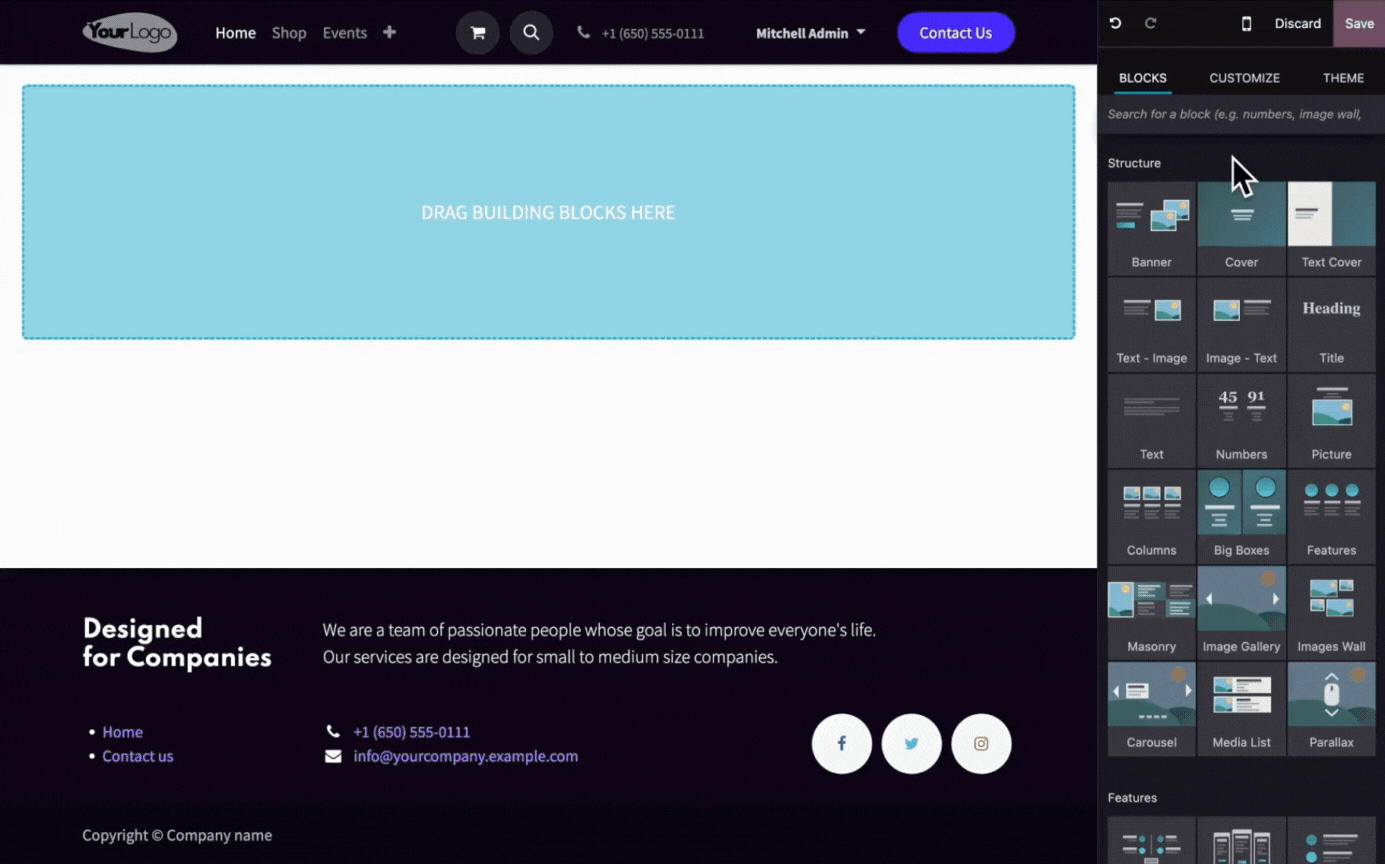
Das Besondere an Odoo Website ist die native Integration mit allen anderen Geschäftsbereichen. Die App ist Teil eines großen, modularen Systems (CRM, Vertrieb, eCommerce, Events, E-Mail-Marketing etc.). Alles lebt in derselben Datenbank.
Das Resultat: Weniger Plugins, geringerer Wartungsaufwand und deutlich mehr Kontrolle.
Für wen eignet sich Odoo Website?
Odoo Website ist dann am sinnvollsten, wenn Sie bereits andere Teile des Odoo-Systems nutzen (oder dies planen). Es eignet sich besonders gut für:
- Kleine und mittlere Unternehmen (KMUs), die ein einziges System wollen, anstatt Kontaktformulare, CRM und E-Mails über verschiedene Tools verteilt zu managen.
- Teams, die keine Lust mehr auf endlose Plugin-Updates, Versionskonflikte und unzuverlässige Schnittstellen haben.
- Unternehmen, die wollen, dass Website, Leads und Marketing-Kampagnen von Anfang an nahtlos ineinandergreifen.
- Unternehmen, die keine Zeit damit verschwenden möchten, mühsam herauszufinden, wie alle Tools zusammenpassen.
- Teams, die eine einfache, intern verwaltbare Lösung suchen.
- Unternehmen, die wachsen möchten, ohne ständig das System wechseln zu müssen, sobald sich neue Anforderungen ergeben
Die wichtigsten Funktionen im Überblick
Odoo Website bietet eine Fülle an Funktionen für Marketing, Content und Conversion, die alle nativ integriert und eng mit Ihrem Odoo-Setup verbunden sind. Hier die relevantesten Features für wachsende Unternehmen:
Visueller Editor
Drag-and-drop-Oberfläche ohne Code mit wiederverwendbaren Design-Blöcken.
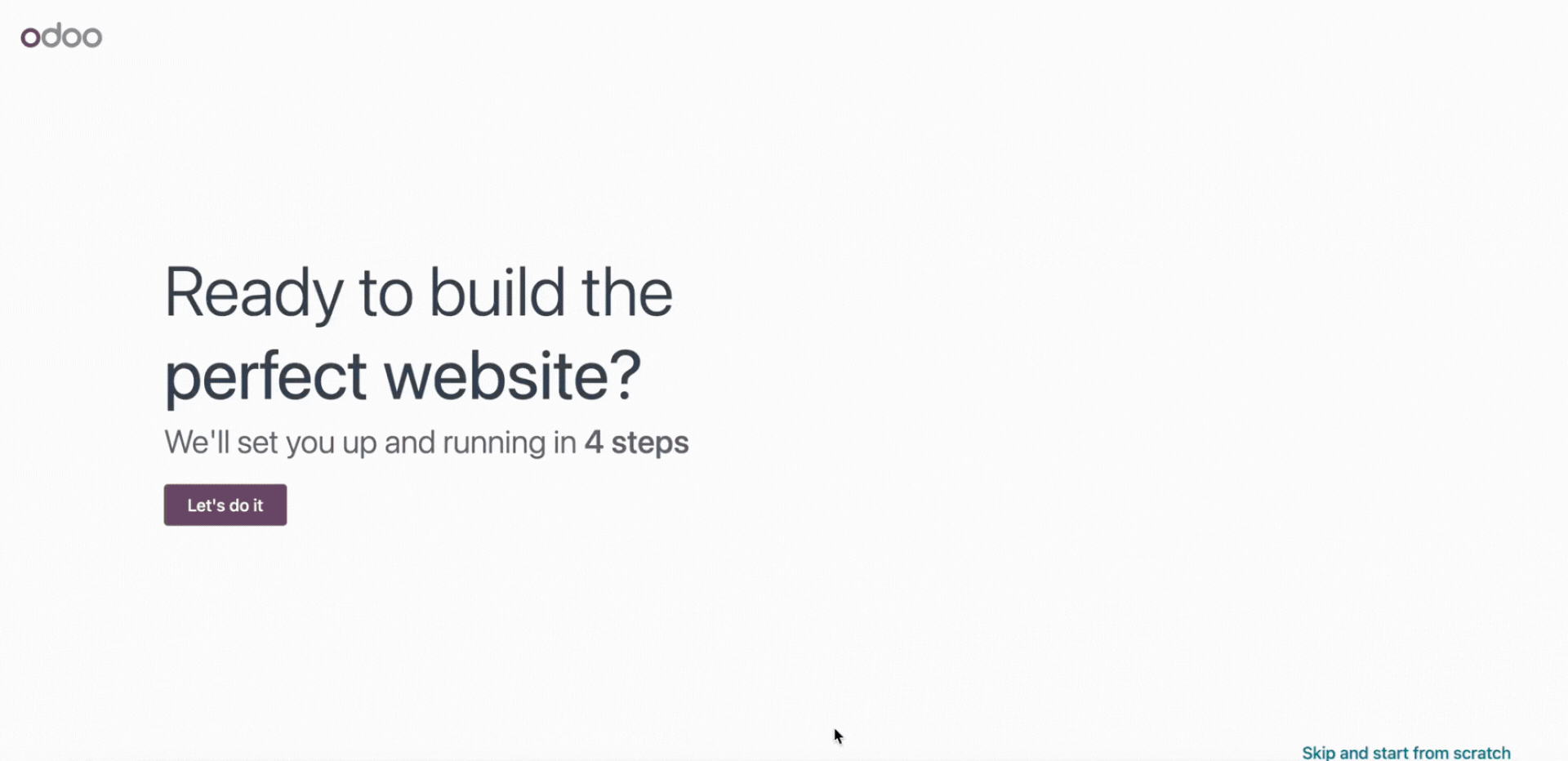
Blog
Einfaches Blog-System mit Tags, Autoren, Planungs- und SEO-Tools.
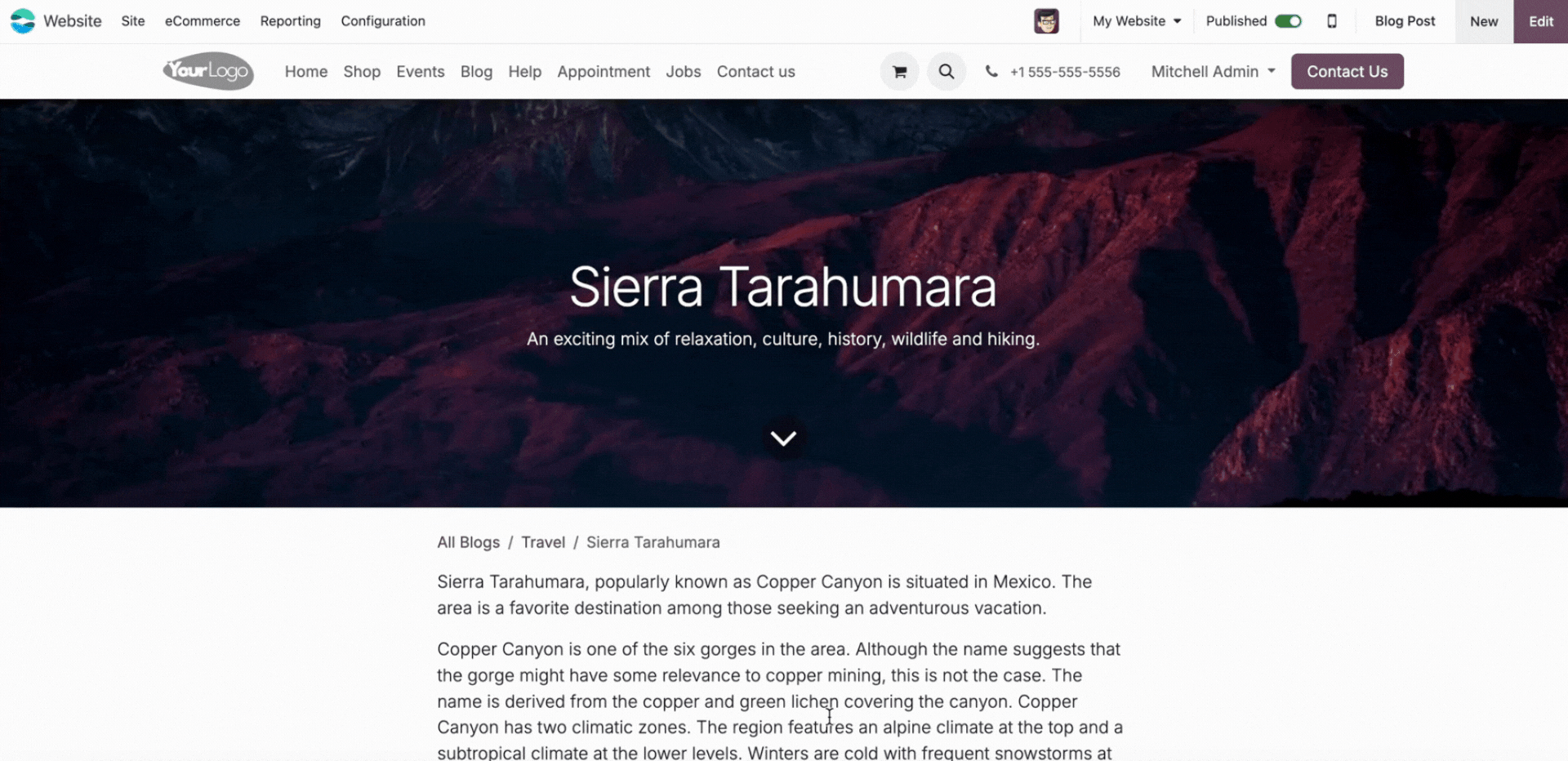
Formulare
Erstellen Sie Kontakt-, Newsletter- oder komplexe Multi-Step-Formulare; Daten werden direkt ins CRM/Mailingliste geleitet.
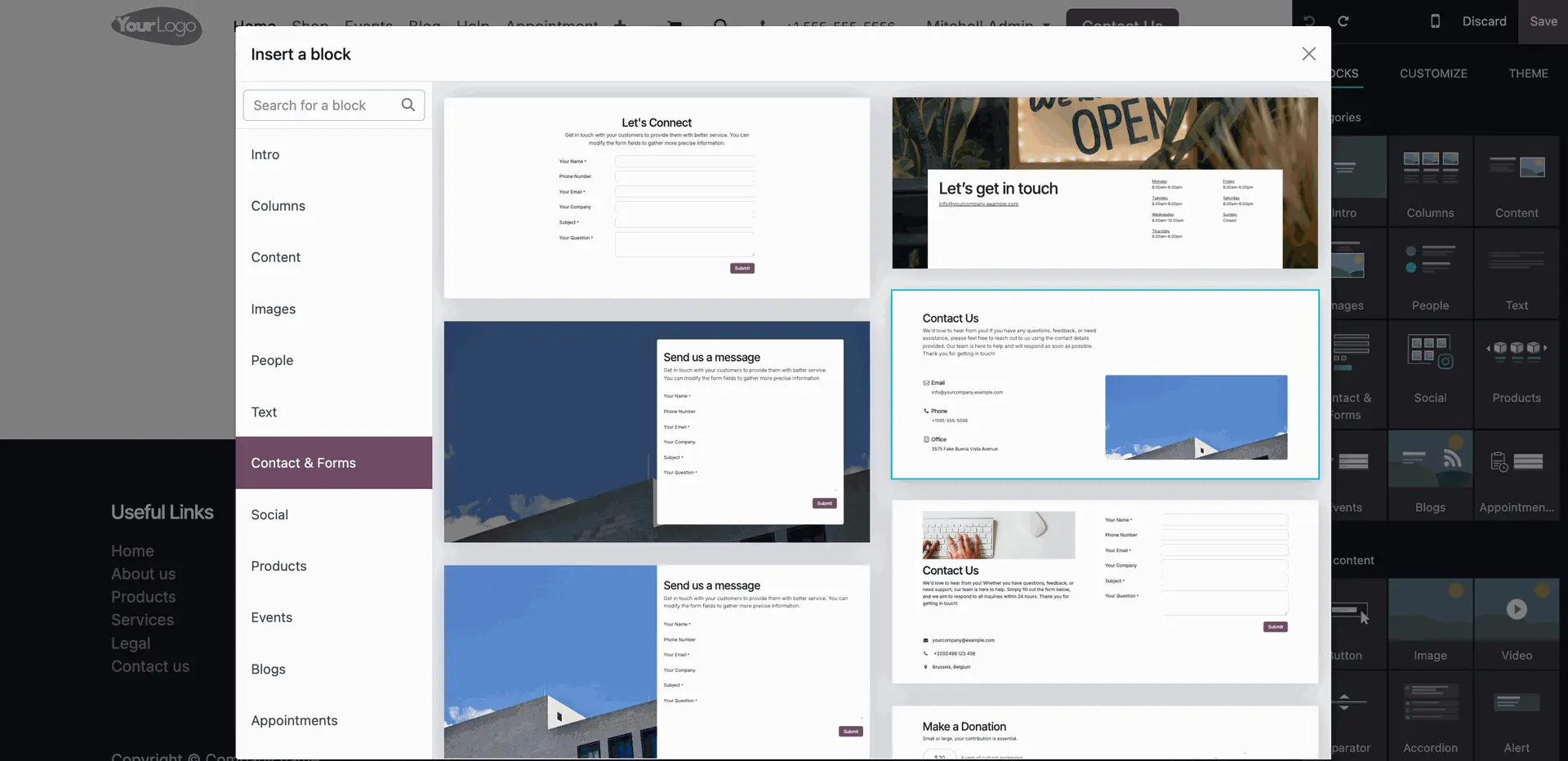
Live Chat
Direkte Kommunikation mit Website-Besuchern, optional Anbindung von WhatsApp zur Lead-Erfassung und Support.
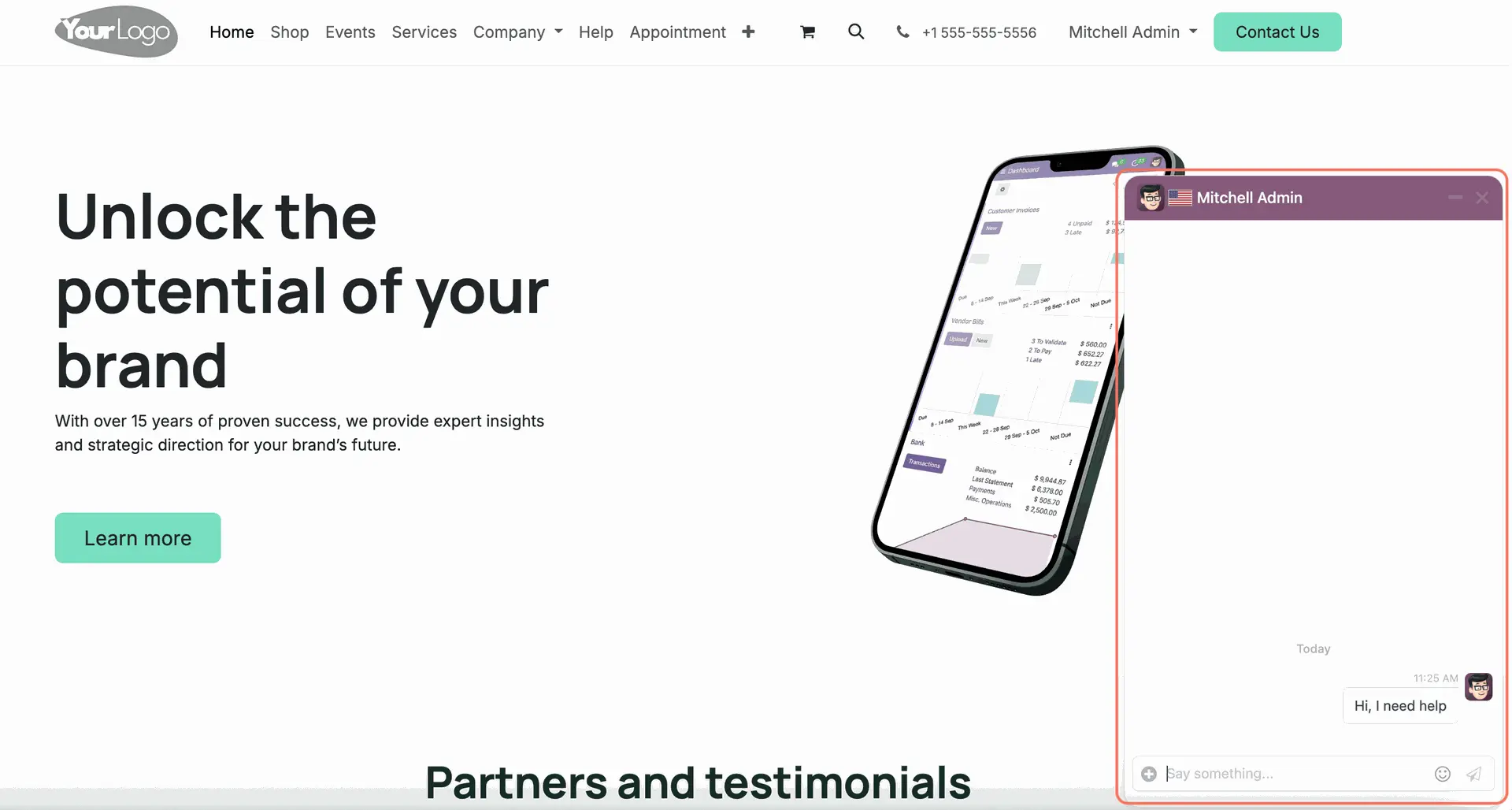
eCommerce
Produktseiten, Warenkörbe, Checkout, Zahlungs- und Versandoptionen – alles aus einer Hand.
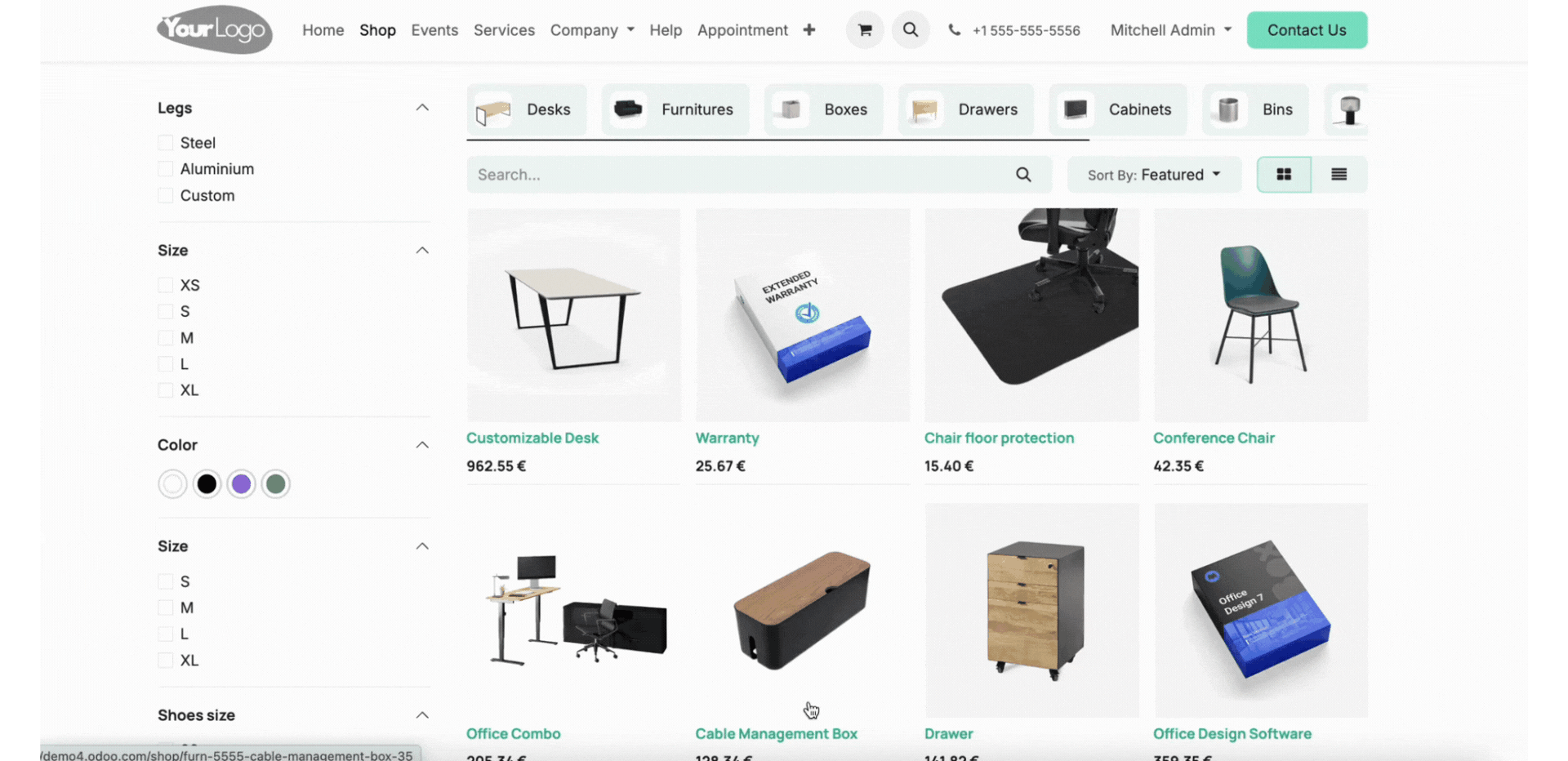
Mehrsprachigkeit/Multi-Site
Verwalten Sie mehrere Websites oder Sprachen unter einem Dach.
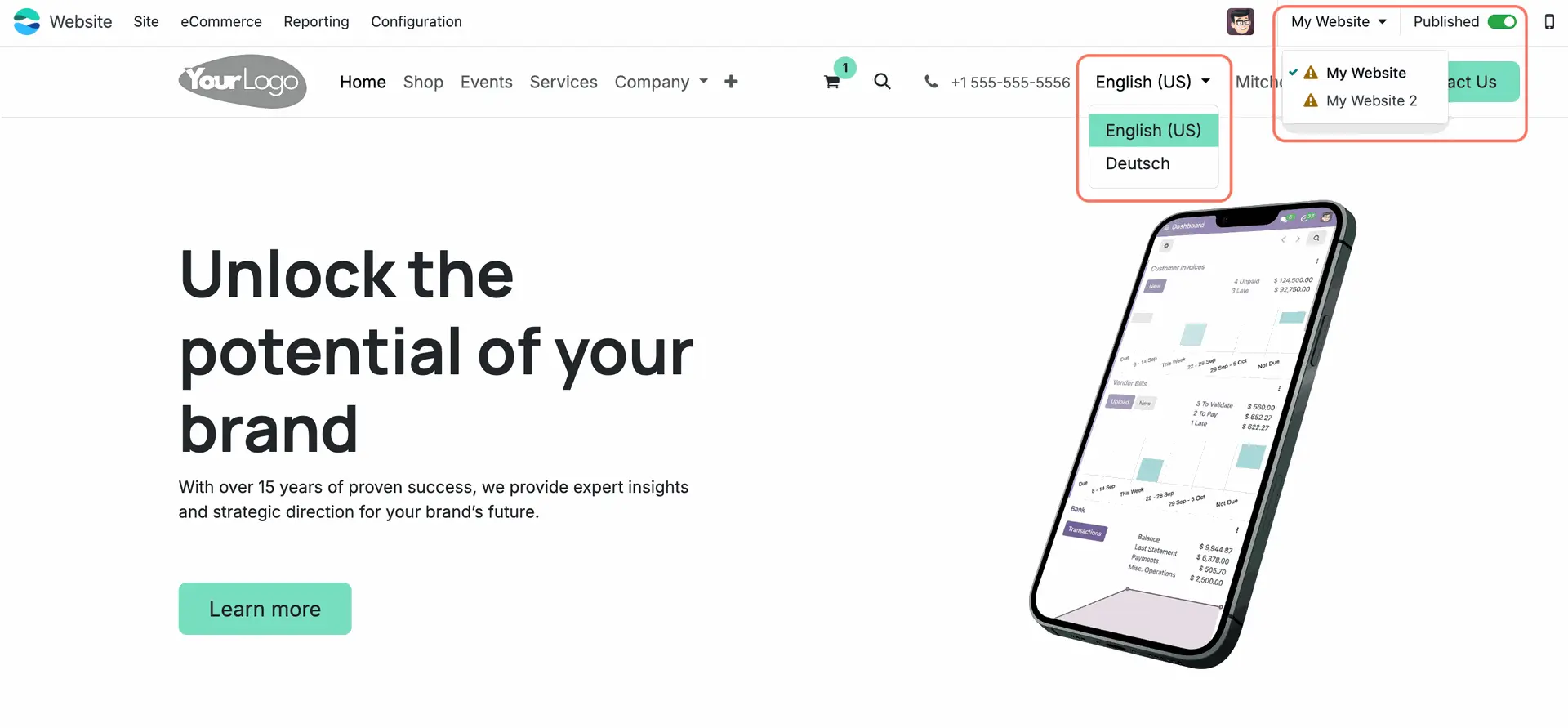
Integrierte SEO-Funktionen
Anpassen von Meta-Tags und URL-Slugs, Canonical-Tags und automatische Sitemap-Generierung.
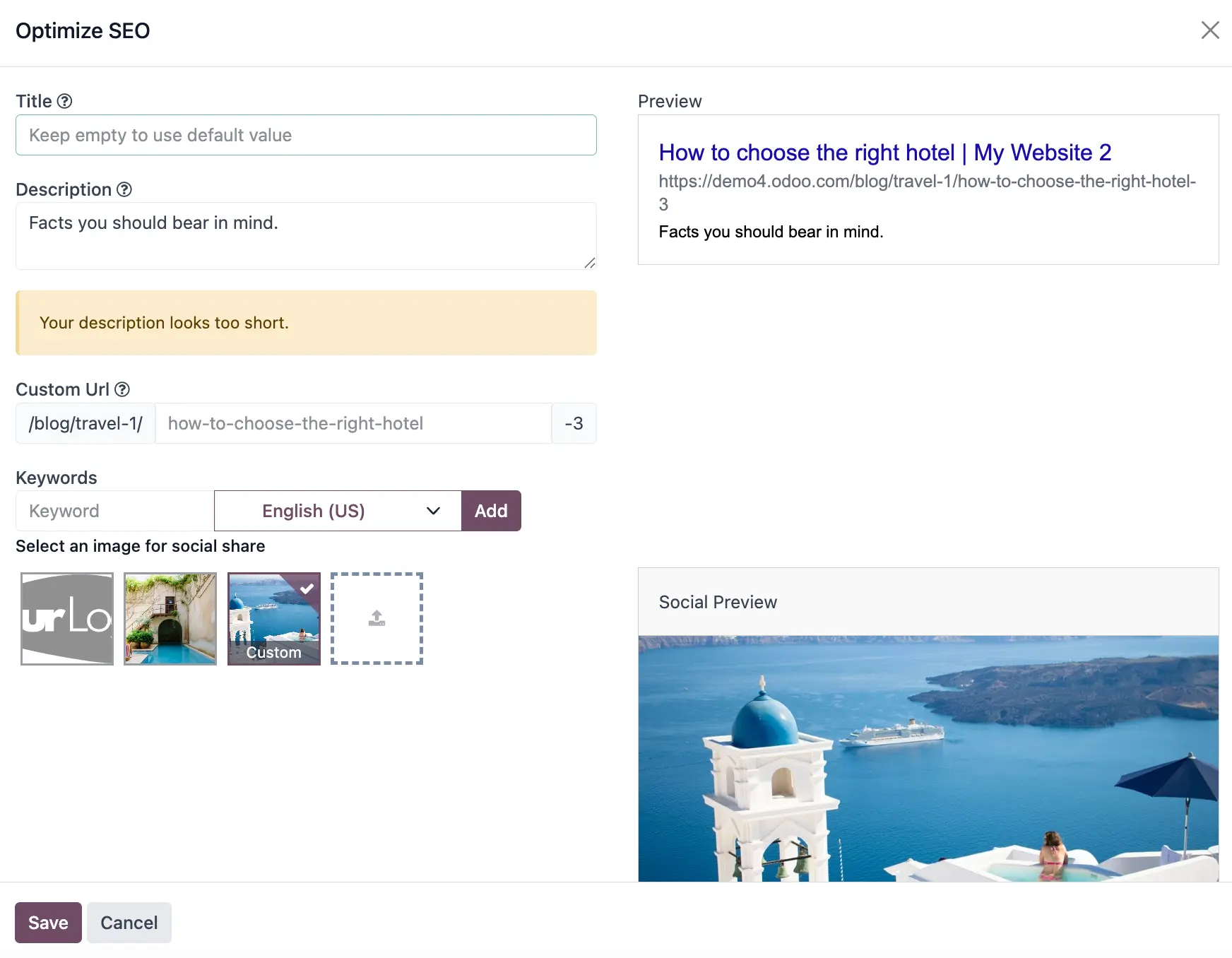
Einfache Integration zu Analyse-Plattformen
Kompatibel mit Google Analytics, Search Console, Matomo sowie Odoos nativem Link-Tracker für Kampagnen.
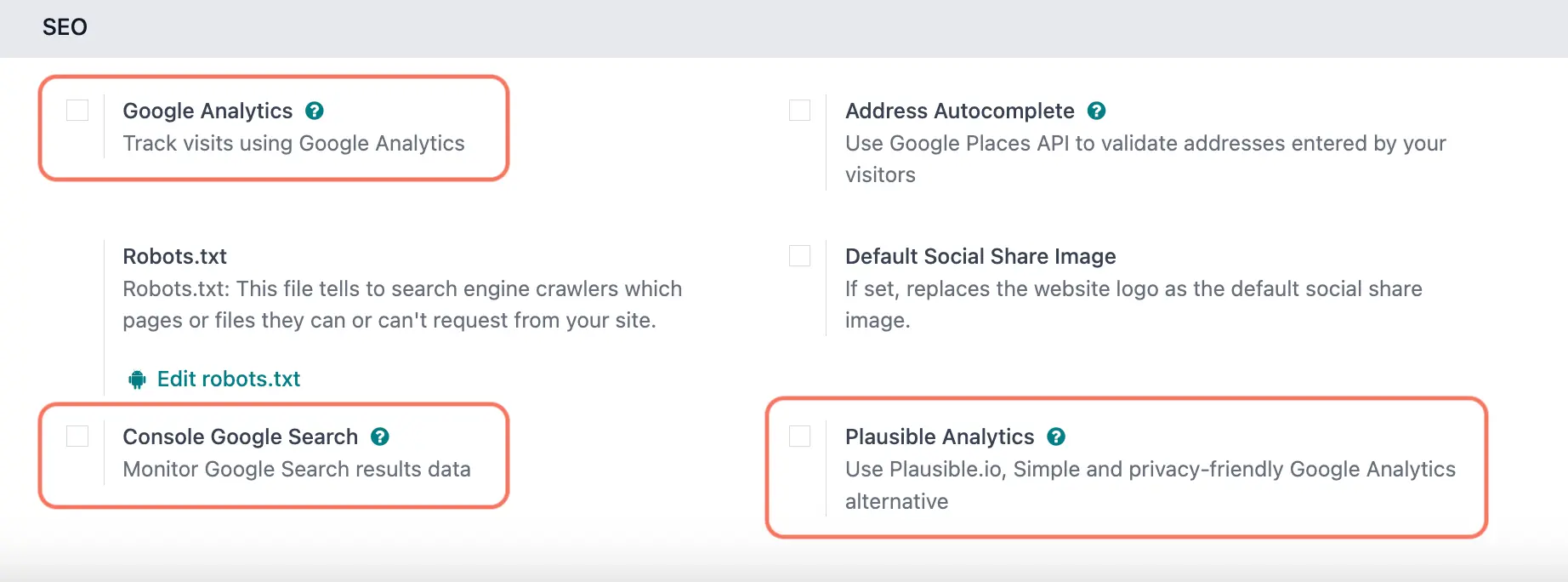
Odoo Website vs WordPress vs Wix vs Squarespace
Wenn Sie nach einer benutzerfreundlichen CMS-Lösung suchen, sind Sie wahrscheinlich schon auf Plattformen wie Wix, Squarespace oder WordPress gestoßen.
Wix und Squarespace sind beliebte Drag-and-drop-Baukästen, während WordPress für seine Flexibilität und sein riesiges Plugin-Ökosystem bekannt ist. Aber wie schneiden sie im Vergleich zu Odoo Website ab?
Feature-Vergleich
Feature | Odoo Website | WordPress | Wix | Squarespace |
Editor-Typ | Drag-and-drop Block-Editor | Klassischer Editor + Block-Editor; mit Plugins anpassbar | Drag-und-Drop WYSIWYG | Abschnittsbasierter visueller Editor |
eCommerce-Funktionen | Nativ, in andere Apps integriert | Diverse eCommerce-Plugins | Mit Business-Plänen verfügbar | Verfügbar, aber vom CRM getrennt |
CRM-Integration | Eingebaut (Odoo CRM) | Plugins von Drittanbietern | Nur Apps von Drittanbietern | Grundlegendes Formular-zu-E-Mail + Integrationen |
SEO-Funktionen | In CRM integriert, keine Plugins | Umfassendes Plugin Ökosystem (z.Bsp., Yoast) | Einfache SEO | SEO Einstellungen für einzelne Seiten/Posts vornehmbar |
Formular-Builder | In CRM integriert, keine Plugins | Eingebaut + Plugin-Optionen | Basisch + Integrationen von Drittanbietern | Eingebaut mit begrenzter Automatisierung |
Mehrsprachigkeit / Multi-Site | Ja (inklusive) | Ja (mit Plugins oder Multi-site-Setup) | Ja (Premium/Business Plan) | Ja (Business Plan) |
Benutzerdefinierter Code | Ja (über Odoo Studio/individuelle Entwicklung) | Voller Zugriff auf HTML, CSS, PHP | Eingeschränkt (außer Velo by Wix) | Eingeschränkt (nur benutzerdefinierte Code-Blöcke) |
Datenhoheit | Volle Kontrolle (besonders selbst gehostet) | Volle Kontrolle (selbst gehostet) | Wird von Wix gehostet | Wird von Squarespace gehostet |
Preisvergleich (2025)
Plattform | Startpreis pro Monat* | eCommerce-Fähigkeiten | CRM-Integration |
Odoo Website | ~20 €/Monat (inkl. Hosting) oder in anderen Plänen enthalten | Ja, nativ | Ja, voll integriert |
WordPress | 4 €/Monat (gehosteter Personal-Plan) | Ja, 45 €/Monat mit WooCommerce | Ja, über Drittanbieter-Plugins |
Wix | 17 €/Monat (Light-Plan) | Ja, ab 29 €/Monat (Core-Plan) | Nein (nur über Drittanbieter) |
Squarespace | 16 €/Monat (Personal-Plan) | Ja, ab 23 €/Monat (Business-Plan oder höher) | Begrenzte Integrationen |
* Die Preise geben die Startpunkte (Stand 2025) ohne Promotionen wieder. Der Preis von Odoo hängt von der Anzahl der Benutzer und installierten Apps ab.
Das Fazit
Wix und Squarespace sind ideal, wenn die Priorität auf schnellem Launch und Design liegt, aber tiefere Business-Integrationen keine Rolle spielen.
WordPress bietet die größte Flexibilität und ein riesiges Plugin-Angebot, erfordert aber mehr Wartung und ist meist auf externe Tools angewiesen, um integrierte Business-Funktionen zu erreichen.
Odoo Website ist die beste Wahl, wenn Ihre Website direkt mit CRM, Formularen, E-Mail-Kampagnen und mehr verbunden sein soll – alles in einer zentralen Datenbank.
Wenn Sie eine Best-of-Breed-E-Commerce-Lösung mit extrem hoher Skalierbarkeit suchen, die sich nahtlos in Ihr System einfügen soll, sollten Sie die Integration von Odoo mit Shopify in Betracht ziehen.
Wenn Ihr Unternehmen bereits Odoo einsetzt (oder dies plant), ist es der logischste und effizienteste Schritt, die Website in dasselbe System zu integrieren.
Vor- und Nachteile von Odoo Website
Der Odoo Website Builder ist konzipiert, um perfekt in das umfassende Odoo-Ökosystem zu passen.
Das bringt immense Vorteile, aber auch einige Einschränkungen.
Wo Odoo punktet
- Nahtlose Integration mit CRM, eCommerce und Marketing.
- Einfache Bedienung für Nutzer ohne Entwickler-Kenntnisse.
- Schneller Start und geringere Wartungskosten.
- All-in-One-Struktur mit minimaler Abhängigkeit von Drittanbieter-Plugins.
Wo noch Luft nach oben ist
- Eingeschränkte Design-Freiheit im Vergleich zu komplexeren, spezialisierten CMS.s
- Kleinere Auswahl an externen Themes und Modulen.
Support, Themes & Praxis-Beispiele
Wenn Sie den Start mit Odoo Website planen, helfen Ihnen diese Ressourcen weiter:
- Themes: Stöbern Sie im Odoo App Storenach kostenlosen und kostenpflichtigen Themes, oder erstellen Sie eigene Designs mit dem Odoo Website Builder. Alternativ können Sie Odoo Studio oder eine individuelle Entwicklung nutzen.
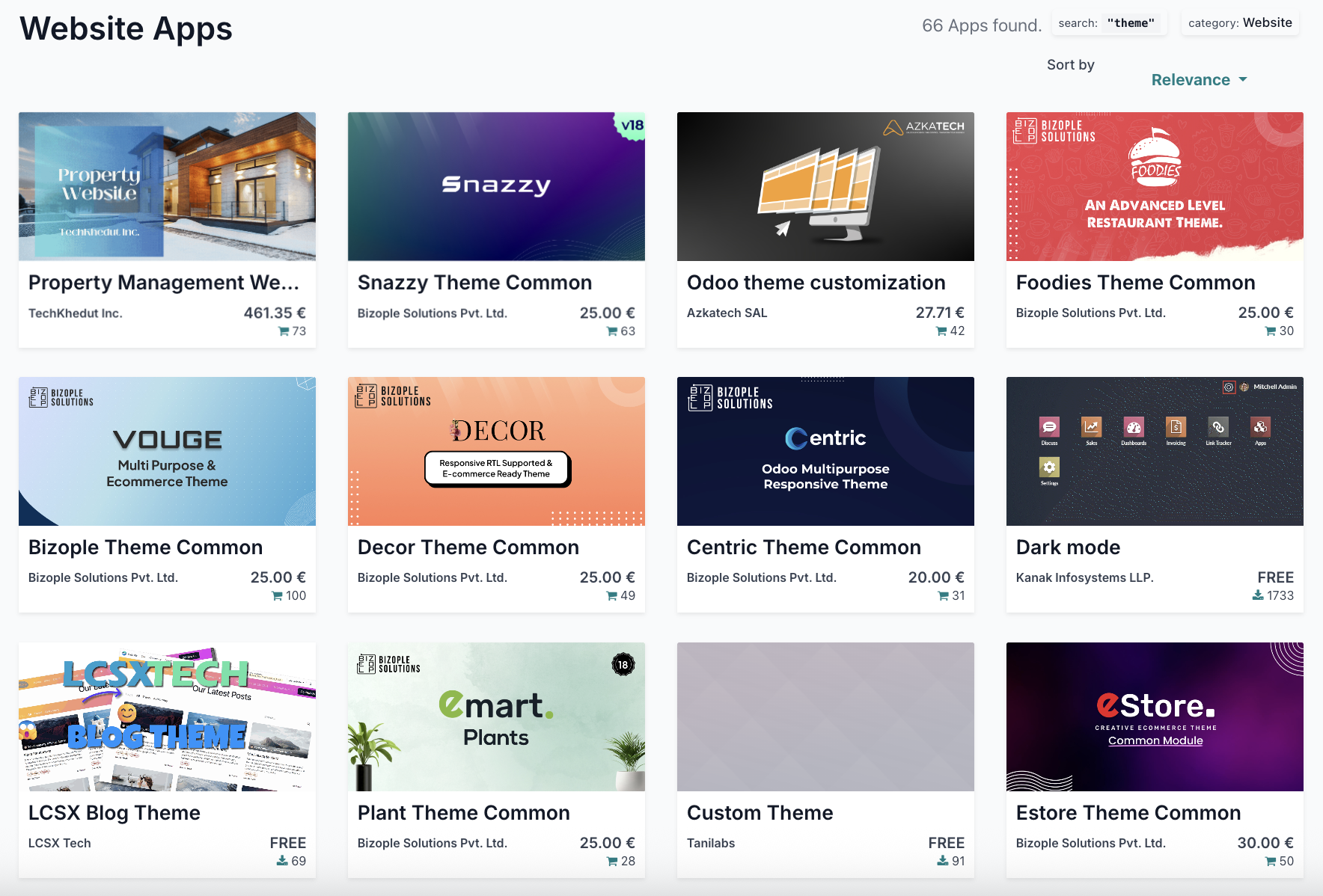
- Support: Verwenden Sie die offizielle Odoo-Dokumentation, fragen Sie die Community im Forum oder arbeiten Sie mit einem Odoo-Partner für die komplette Implementierung zusammen.
Unsere eigene Website ist ein gutes Beispiel! Sie basiert vollständig auf Odoo und nutzt dessen Standardfunktionen, um nahtlos zu funktionieren – ganz ohne einen „Plugin-Zoo“ oder umfangreiche Anpassungen.
Weitere Beispiele finden Sie im Odoo Website Builder Showcase.
Bereit für Ihre integrierte Website mit Odoo?
Wenn Sie über einen Wechsel nachdenken oder Hilfe beim Start benötigen, unterstützen wir Sie von der Einrichtung bis zum Launch. Wir stellen sicher, dass CRM, Formulare und Marketing vom ersten Tag an nahtlos verbunden sind.
Kontaktieren Sie unsere Odoo-Experten für eine kostenlose Beratung, um zu sehen, wie dies für Ihr Unternehmen aussehen könnte.